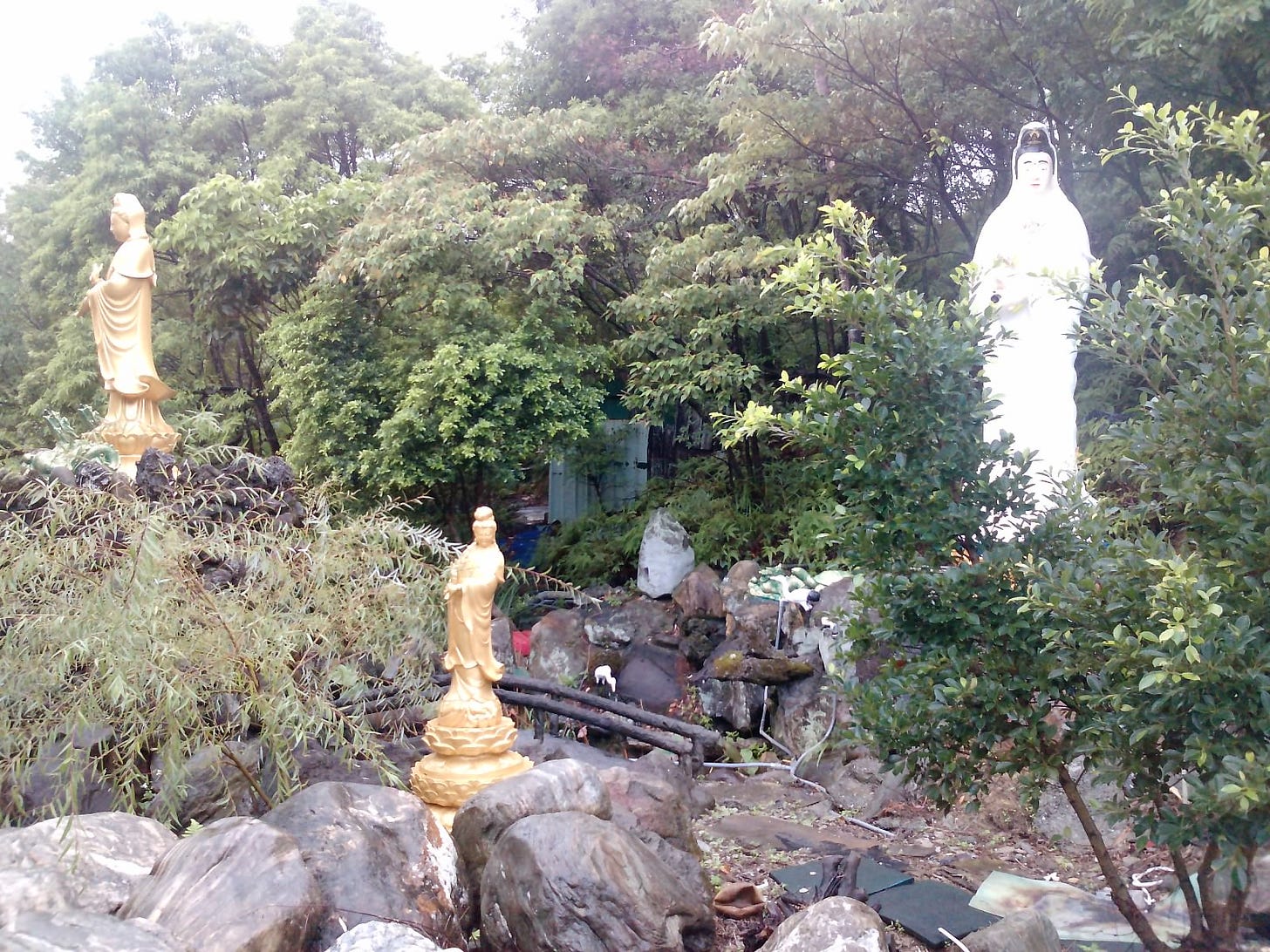I’ve always said — I don’t know who I would be today had I not left the US in 1984, and lived in Taiwan and Mainland China for over 20 years!
The learning of a new language established a new worldview in my American mind. A worldview that supports me to see life from a different cultural-linguistic perspective. It not only led me to achieve a lifelong desire to learn another language and culture to the level of that of my American one, but I gained a universe-view! The Chinese, more aptly, refer to their “big view” as a universe-view—a millennial-year awareness reaching beyond the clouds.
In this, my first book, premier in The Heart Of China series, I share my experience with mindfulness mediation, a practice I learned from my teacher, 空海法师 the Venerable Kong Hai, a Buddhist monk in Taiwan.
But how I came to know him was ‘serendipitous.’ In Chinese, it would be called, “缘分 yuán fèn,” referring to a meeting that seems based in a universal planning—like the meeting of old friends. In English, the meaning of serendipitous falls in line with yuan fen, but applies differently.
The CD With No Name
While working in Harbin, China, managing a California furniture manufacturer's office, based out of Anaheim, I wanted to find a Buddhist study or meditation group. So, I visited the biggest Buddhist temple in Harbin city, 极乐寺 Ji Le Si Temple. I inquired into the head Monk managing the temple if there were any groups I could get involved in. He told me no, but gave me a CD. The CD was a copy of another CD and had no writing on it. After thanking him, I left, then took the CD home and filed it away somewhere.
Years later, after returning to the States and having moved from China to San Diego, I accepted a position with an MLM company in Phoenix. One day, preparing to drive from Phoenix to San Diego to visit friends, I found the CD, which I had not yet listened to, and took it with me to listen while driving. I put the CD with no name into the player of my red Ford Focus SVT and headed off for the four-hour drive to San Diego.
I heard a man speak about the Diamond Sutra, a famous Buddhist sutra, in Mandarin with a heavy Taiwanese accent. I listened intently. The more I listened, the more intensely I listened. Driving, I remember thinking several times what the teacher was saying spoke exactly to how I feel. The teachings and ideas he expressed fit my personal perceptions like a glove. What he said made too much sense to me!
Listening, I wondered where this place was and who was speaking. Only one time during the whole talk did he mention his name and the name of a temple he was associated with.
A Temple and a Monk from Taiwan
Later, I signed on to my computer and began searching for the temple. And I found it in a town named 基隆 Ji Long, on the northern coast of Taiwan. I sensed a strong desire to access more teachings from the monk I heard on the CD, with no name, from Harbin. But it seemed challenging without picking up and going to Taiwan. Not something that appeared workable.
A few months later, I got laid off from my position in Phoenix. I began the search for a new job. Within three months, a California company looking for an interim General Manager for their Taipei office in Taiwan hired me.
I don’t know if I was more excited about the job or to know that I could find and connect with the monk on the CD with no name.
Within days of arriving in Taiwan, during the first weekend, I hired a car to drive me to Ji Long. I told the driver the name of the temple, and he found it. Once I arrived at the temple, I met the monk on the CD with no name, his name—空海法师 the Venerable Kong Hai!
During the year I was in Taiwan, I frequented the small retreat Kong Hai’s group used. It is just outside Taipei city, on a small mountain where there are multiple small Buddhist retreats and learning centers. On weekends, I attended intimate study groups and meditation retreats led by Kong Hai.
Kong Hai has an interesting background in Buddhist and Chinese philosophy studies. He refers to the form of Buddhism he teaches as “原始佛教 Early Buddhism.” It follows the teachings of the Pali Canon, the earliest Buddhist writings, which are the foundation of fundamental Buddhism. Kong Hai also intermingles aspects of ”道 The Dao” (Tao), concepts which meld into a “universe-view” encompassing all of existence.
It is said nothing that exists, exists outside of the Dao—a view that contains all of existence.
It’s Buddhism Learned by an American in Chinese
I’ve had people tell me they aren’t interested in Chinese Buddhism. This is not Chinese Buddhism, it’s simply what I learned through the Chinese language and cultural ‘universe-view.’ There are words used in Buddhism that don’t have direct translations in English, because the ‘universe-view’ is so different. Many words used to express ideas of the Buddhist worldview in English, miss certain aspects of meaning found in Chinese, a language that has been influenced by Buddhist concepts throughout the millennia.
In this book the first of the series, The Heart Of China: How Mindfulness Changed My Life, I share mindful meditation practices, ideas, and methods, including mindful breathing, mindful eating, and anxiety management to mention a few. These are things I learned over the years; including ideas that spawn from a Chinese cultural-linguistic mindset, which I swap into English in the book.
In future books, I will share about the Dao, the Yi Jing (I Ching Book Of Changes), and other fascinating aspects of Chinese thought that form the Chinese ‘universe-view.’
I hope you will consider reading my book to learn more.
Peace! 🙏
Todd Cornell is the author of The Heart Of China, How Mindfulness Changed My Life. Available March 15th, 2022.










Hi Todd, We met on the substack zoom today and here's my contact and stuff: mindstrengthbalance.substack, mindstrengthbalance.com, and LS@mindstrengthbalance.com